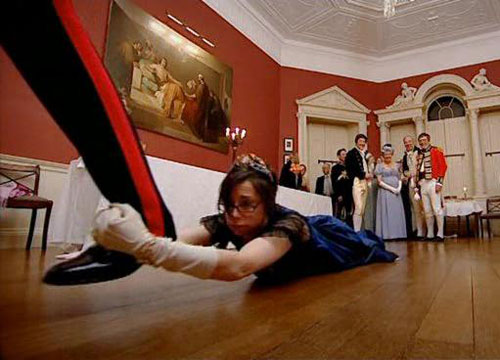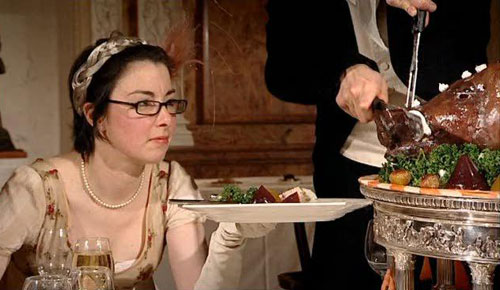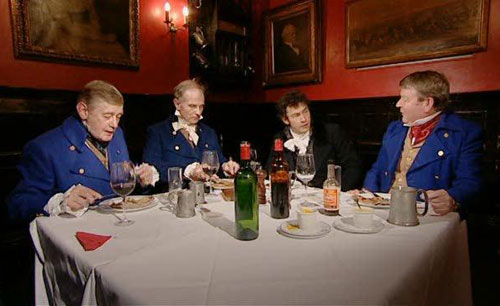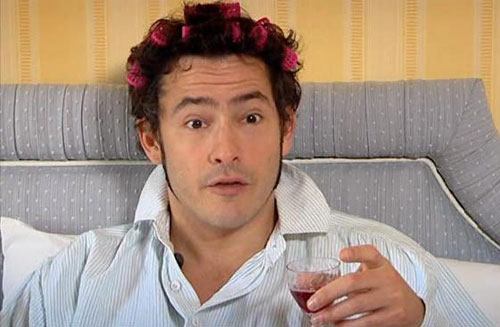The Supersizers Go ... Regency
The sixth and final episode of The Supersizers Go was dedicated to the Regency period, the time of Jane Austen and the lecherous, gluttonous, foppish, trend-setting Prince Regent, later George IV. Again, Giles and Sue play a well off middle-upper class couple of the day--he is a small landowner with an inheritance of around £50,000--but instead of being married as in other episodes they are brother and sister. This is so that they can portray the difficult state of an unmarried woman (Sue) with not much of her own income. The cold and sometimes horrified expressions on her would-be suitors' faces reacting to her desperate advances seemed a bit too genuine. Here she is trying to hang onto a gentleman.

Despite the elegance and relative comfort of the age for the gentry, factors such as the Enclosure Act which prohibited anyone but the landowners from hunting on the land (anyone else became guilty of poaching), bad harvests and high taxation lead to food riots and famines. It was a desperate time for the poor. The episode only touched lightly on this facet of Regency society though, and concentrated on the frivolous lifestyle of the wealthy. (The scene where Sue goes around to the 'poor' distributing leftovers, reminded me of the scenes in Little Women where the girls go to poor German or Irish families and give them hampers, which made up of their own food wrapped up. Granted, Little Women was written in the later half of the 19th century and is set in New England, but the sentiment seems to be the same. And it's very uncomfortable to read about or watch with modern eyes, or at least my eyes. I was not born to act out noblesse oblige.)
At the beginning of the period, the English were at war with the French, so all French foods and drink (especially the beloved claret) were banned from dinner tables. Instead, people at food that is even now recognized as being Very English: Roast beef, Yorkshire Pudding, trifle, and so on. Later on after Napoleon was defeated, French food was politically correct again, and the Prince Regent hired Marie-Antoine Carême, who is still regarded as one of the greatest chefs of all time. Just looking at the English menus vs. the French menus, there's little wonder that French haute cuisine became so revered. (Though surely the 'very English food' wasn't that bad?)
Quite a lot of things about this period seemed quite familiar, mainly I suspect from all the hours I've spent watching Jane Austen dramas. (I have read Pride and Prejudice but admit to having never read her other books.) Even the offal didn't seem so bad - I suppose sweetbread came the closest to that, but I happen to like sweetbread (it's quite bland and soft, and is usually fried until crispy on the outside in butter). The obligatory Animal Head Dish was a stuffed and elaborately decorated small boar (though they probably used a pig)...it looked rather cute. Here Sue takes a nice slice of snout.

Most of the food looked quite edible really, if a bit heavy. I'd be happy to eat things like roast beef with Yorkshire pudding, trifle, and ice cream, though in smaller quantities and with more vegetables. And now I finally know what the heck jugged hare is. (It's chopped up bunny meat cooked with herbs and things in a jug that is poached in a vat of hot water.)
Other things from this episode:
- The main chef was TV chef Rosemary Schrager, who is a very fun lady to watch. If you have never seen her, she's sort of like the Fat Ladies, but more down to earth.
- The 'restaurant' chef was Mickael Weiss of London restaurant La Coq d'Argent, who appeared in several other episodes too.
- Exotic fruits were grown in greenhouses by the rich, and were highly desirable, as were imported nuts like pistachios.
- Giles had an inheritance of £50,000, equivalent to £2.5 million today. I went back to Pride and Prejudice to compare this with what Mr. Bingley and Mr. Darcy had - Mr. Bingley had an annual income of £4,000, while Mr. Darcy's income was more than £10,000. No wonder Mrs. Bennett went bonkers over the prospect of her daughter 'catching' Mr. Bingley, and Mr. Darcy must have had her awed once she found out. Here is a great page with a chart that compares Regency and present-day money figures, which seem to differ a bit from what is stated in Supersizers, but you can get a general idea.
- Cheese was rather maggoty... (but such cheese still exists on Sardinia!)
- Instead of French wine, people drank port (from Portugal), sherry (from Spain), and German wines.
- Drinking and bathing in mineral water (especially at Bath) was very popular for ones health.
- A lot of men suffered from gout, a very painful illness.
- An unmarried gentlewoman with no income of her own really had it hard when it came to life prospects.
- There was a bestselling guidebook to prostitutes called Harris's List of Covent Garden Ladies. Sounds quite useful.
List of food and drink consumed in this episode
Breakfast
- Toasted Bread
- Turtalong (bread rolls looking like mini-bagels)
- Seed cake
- Marmelade
- Jam
- Hot Chocolate
- Tea (they were complaining about the weakness of the tea...it seems Sue Perkins prefers "builder's strength" dark tea)
Dinner
Taken any time between 11AM and 2PM
First Course:
- Mackerel broiled with Herbs
- Roast Beef (very very well cooked)
- Yorkshire Pudding
- Spinach
- Wow-wow Sauce (sauce made with gherkins, onions and port)
- Port
- Sherry
Second Course:
- Jugged Hare (cut up bunny mixed with herbs and steam-cooked in a jug for three hours)
- Potted Venison
- Beetroot Pancakes
- Asparagus
- Trifle
- German Wines
- Port
Supper
By fashionable candlelight, around 10PM
- Cold roast beef
- Sweetbreads
- Apple Pie
- English Rarebit (cheese on port-soaked toast)
- Stewed Celery
- Port
- Sherry
Giles' breakfast in bed, as the Prince Regent ate
- A big Meat Pie with 2-3 pigeons and beef
- Champagne
- Port
- Moselle
- Claret
- Laudanum to kill the pain
(The Prince Regent suffered from gout and became morbidly obese. His nickname in the press was the Prince of Whales.)
Taking the waters at Bath
- Spring water to treat whatever ails you
- Ice cream (flavors include brown bread, parmesan, cinnamon, pumpkin, cardamon, nutmeg, tea)
Luncheon at the Inn
On the way to London (Luncheon, also called Noonshine, was the precursor to lunch)
- Stilton Cheese with optional maggots
- Cheddar Cheese with cheese mites
- Cold Meats
- Cucumber Salad
- Lobster
- Asparagus
- Bread
- Cider
A Patriotic Beef Steak Supper with members of the Sublime Society of Beefsteaks
This was supposed to be a patriotic, anti-French statement. The Society is still alive and well, apparently. (I confess, I instinctively wanted to punch my foot through the screen and kick these geezers for some reason.)

- Beef Steaks
- Shallots
- Beetroot
- Baked Potato
- Cheese on Toast
- Mustard
- Port
- Stout
Dinner a la Marie-Antoine Carême
First Course:
- Potage de Bisque à la Régence
- Pain de Volaille
- Champagne
- Sherry
Second Course:
- Bure de Sanglier en Galatine (a stuffed and dressed boar's head, with jellies and deep fried cockscombs)
- Bâtelets à la Royale
- Saumon à la Rothschild (salmon poached in champagne with truffles)
- Chartreuse
- More Champagne
Dessert:
- Pièce Montée (an elaborate sugary centerpiece)
- Strawberry Soufflé
- Meringues
- Marzipan Fruit
- Vol-au-Vents à la Neslé (a savory puff pastry pie, with a surprise inside of cockerel's testicles, an aphrodesiac)
- Even more Champagne
Byron's Breakfast before a duel
Apparently Byron was a bullemic and anorexic obsessed with this weight.
- Tea mixed with a raw egg
Gambling snack
Where Giles gambles away his family fortune
- Sandwiches (meat in between slices of bread, invented by hardened gambler Lord Sandwich)
Giles in Debtors' Prison
- A Cheshire Pork Pie, brought in by Sue (to last for several days)
- Port
Ball to celebrate the Coronation (1821)
Preliminaries:
- Sue massages her head with raw eggs and gives herself a brandy-milk-lemon facial, then rinses her hair with rum
Ball Supper:
To start:
- Brandy and claret punch
- White Soup (soup with mutton, veal, bacon, almonds, macaroni)
Main:
- Hare Cake in Jelly
- Chicken Hogs Tongues
- Petit Pasties of Veal
- Collared Beef
- Pyramids of Crayfish (in jelly)
- Asparagus
- Sandwiches
- Artichoke Bottoms
- Trifles
- Sweetmeats
- Champagne
- Claret
- Sherry
- Hock
- Port
Dessert:
- Selection of ices
At the conclusion of Supersizers Go
There are three things that will stay with me after viewing the Supersizers Go series.
- Wealthy English people throughout the ages used to eat a Lot. Of. Meat.
- Gelatin (leaves or powder) must have been a revolutionary invention.
- Giles Coren looks fantastic in period costume. I think his best periods were the Elizabethan and Regency. (He looks rather ordinary in present day garb.) Here he is enjoying breakfast in bed as a Regency gentleman, with his hair in curlers.

I'm not sure how much educational benefit there was to the series in the end, but it sure was entertaining. I would not mind seeing another season, sending Giles and Sue to other periods or perhaps even other lands. The Greeks? Byzantium? The Ottoman Empire? Vikings? The Eighties? Why not?
This of course concludes my lengthy recaps. I hope you enjoyed them.
Supersizers Go recaps
- Edwardian Supersize Me, not part of the series, but sort of the pilot that aired in 2007
- Description of the whole series, plus World War II (episode 1)
- Restoration (episode 2)
- Victorian (episode 3)
- 1970s (episode 4)
- Elizabethan (episode 5)
If you enjoyed this article, please consider becoming my patron via Patreon. ^_^

 Welcome to Just Hungry, where we serve authentic Japanese recipes and more! I'm
Welcome to Just Hungry, where we serve authentic Japanese recipes and more! I'm 













Comments
KatyBelle
27 June, 2008 - 20:26
Permalink
Do you mean Jane Austen?
Do you mean Jane Austen?
maki
27 June, 2008 - 20:53
Permalink
Odd typo there.. I wonder
Odd typo there.. I wonder why I put "James". Thanks for catching it!
Fran Magbual
28 June, 2008 - 06:14
Permalink
Hope I Can See These!
I really hope these get to air on BBC America.
Su-Lin
28 June, 2008 - 09:08
Permalink
Thank you so much for these
Thank you so much for these episode recaps! I'm currently out of the country (UK) with no access to the BBC iplayer and I had really wanted to see the last couple of episodes! And thanks to you, I "watched" them!
wheezay
28 June, 2008 - 14:42
Permalink
Thanks
I loved your recaps..I was usually grossed out by some of the food tho.
Hope they make it to BBC America, I'd like to see the series.
Basak
28 June, 2008 - 17:30
Permalink
I want to see them go to
I want to see them go to Japan actually.
Ottoman cuisine would be brilliant, too.But then they'd be spoilt for life :-D
foodhoe
4 July, 2008 - 16:58
Permalink
great leading picture
I haven't heard of this show, it looks very interesting and especially so with the amount of detail you have!
Anonymouse
5 July, 2008 - 12:06
Permalink
This is so wonderful. I wish
This is so wonderful. I wish one of the dutch networks would broadcast this series! I love the history of gastronomy, and the history of food utensils. Mmh, the mackerel broiled in herbs reminds me somewhat of a great indonesian dish, called ikan pepesan, where you take a mackerel and just soak it in herbs and spices, just by cooking it. But I bet during the regency period they didn't use hot spices though;-)
Pamela
6 July, 2008 - 19:28
Permalink
I saw this episode, it was
I saw this episode, it was brilliant!
anon.
13 April, 2010 - 13:27
Permalink
Re: The Supersizers Go ... Regency
Thought Giles was great in the series, but for me Sue's ways spoilt it
Rosie
7 August, 2010 - 19:48
Permalink
Re: The Supersizers Go ... Regency
Again, Giles and Sue play a well off middle-upper class couple of the day—he is a small landowner with an inheritance of around £50,000—but instead of being married as in other episodes they are brother and sister.
There is no such thing as a middle-class landowner or an upper-middle class landowner. If "Giles" is playing a landowner with a fortune of 50,000 pounds, he is upper class. Landed gentry.
Rosie
20 July, 2012 - 18:52
Permalink
Re: The Supersizers Go ... Regency
["Again, Giles and Sue play a well off middle-upper class couple of the day—he is a small landowner with an inheritance of around £50,000—but instead of being married as in other episodes they are brother and sister."]
I'm curious . . . how does an early 19th century small landowner with an inheritance of £50,000 end up in the "middle-upper class"?
maki
20 July, 2012 - 23:45
Permalink
Re: The Supersizers Go ... Regency
Where would you classify them in the social structure then? From an inheritance of £50,000, they may have derived an income of £5,000 per year if they were very lucky (at 10%), plus the income from their estate. That most likely put them in the upper echelon of the middle class landed gentry, but not at the very top. They were very well off but not super-rich.
Rosie
25 July, 2012 - 20:34
Permalink
Re: The Supersizers Go ... Regency
As a landowner, Giles would simply be considered a member of the upper-classes. Although have a more than supple income helped, there are certain requirements needed to be considered a member of that class:
*One has to be a landowner or legally related to said landowner
*Said landowner has to earn his income exclusively from the estate. If a wealthy man earned his income from a factory/shop or any other kind of trade, he would still be viewed as middle-class . . . despite his money.
With the upper-classes, it was all about bloodline and being tied to the land; not about the amount of income earned. Like I said, many desired a large income to live well. But if they really want to be a part of the gentry, they must have blood ties to the land and/or old gentry families.
Melinda
29 October, 2013 - 12:24
Permalink
Re: The Supersizers Go ... Regency
Thanks for adding up some entertaining pages from the popular epsiode of "The Supersizers". The characters played by Giles and Sue attracts the minds of viewers and the credit goes to both of them for playing it so beautifully. Cheers.
Check this too. windows live technical support